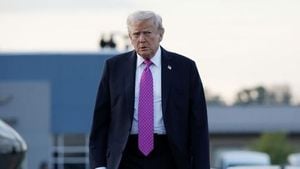Diplomacy and tension are running high on both sides of the Atlantic as the United States and European Union prepare for a critical round of talks aimed at tightening the economic screws on Russia and seeking an elusive end to the war in Ukraine. The flurry of activity comes after a summer marked by failed deadlines, renewed violence, and mounting frustration in Washington and European capitals alike.
On September 5, 2025, Treasury Secretary Scott Bessent reached out to Ursula von der Leyen, President of the European Commission, in a private conversation intended to set the stage for a pivotal meeting scheduled for Monday, September 8. This discussion followed a call between Vice President J D Vance and von der Leyen just the day before, highlighting the high-level engagement and urgency surrounding the issue. As reported by sources familiar with the meeting, officials from the White House, State Department, and US Trade Representative will join their European counterparts—experts on energy, sanctions, financial services, and trade—at the table in Washington.
President Donald Trump, now three and a half years into Russia’s war in Ukraine, has grown visibly exasperated with his inability to broker peace. The conflict, sparked by Moscow’s invasion, has proven stubbornly resistant to diplomatic efforts. Last month, Trump hosted Russian President Vladimir Putin in Alaska for a high-profile summit, pressing him to enter direct negotiations with Ukrainian President Volodymyr Zelenskyy. Despite the fanfare, the summit failed to produce a breakthrough, and a Trump-imposed deadline for the Kremlin to end its aggression—set for August—came and went without resolution.
The aftermath of the summit was anything but calm. According to reporting from international outlets, Russia launched a rare drone and missile assault on western Ukraine, striking an American-owned electronics plant in a move widely interpreted as a message to Washington. Although Trump’s anger toward Putin has reportedly intensified, he has so far stopped short of imposing new sanctions. Instead, he’s chosen to wield public pressure, telling reporters at an Oval Office meeting with Polish President Karol Nawrocki, “we’ll either be happy about it or unhappy. And if we’re unhappy about it, you’ll see things happen.”
The president’s rhetoric has sharpened in recent days. On September 4, Trump publicly called on European leaders to halt purchases of Russian oil, noting that Russia had reaped 1.1 billion euros in fuel sales from the European Union in just one year. According to a White House official, Trump also stressed the need for Europe to exert economic pressure on China, which he accuses of indirectly funding Russia’s war effort. The official, not authorized to speak on the record, described the president’s private talks as “forceful” and “insistent.”
Meanwhile, European leaders have not been idle. Just this week, 26 countries convened in Paris and made a landmark commitment to participate in a deterrence force in Ukraine once the war ends. The move signals a growing willingness among European nations to take collective action, even as the US position on post-war security guarantees remains somewhat ambiguous. European Council President António Costa announced on Friday that a “European team” would travel to Washington to coordinate on joint sanctions, with the European Commission preparing to unveil a 19th package of measures targeting Russia.
Former US Vice President Mike Pence, speaking in Brussels on September 5, echoed the urgency of the moment. “Now is the time ... for the United States and our European allies to take additional action,” Pence told Euractiv. He pointedly referenced the passing of Trump’s “self-imposed deadline” for Russian withdrawal, adding, “Putin doesn’t want peace; he wants Ukraine. Putin only understands strength.”
Pence has thrown his support behind US Senator Lindsey Graham’s push for sweeping tariffs on countries that continue to buy Russian oil and gas. The US has already slapped a 50% tariff on India for its purchases, and Pence suggested that similar measures could be extended to European countries like Hungary and Slovakia. “I’d encourage you to look at Senator Graham’s legislation. I think it’s important that we target the countries that are fueling the Russian war machine with strong secondary sanctions,” Pence said. “Vladimir Putin needs to see that the United States and our European allies are committed to peace but we’re also committed to consequences if he continues to wage this brutal assault on civilian populations in Ukraine.”
Asked about the US commitment to Ukraine’s post-war security, Pence was cautiously optimistic. “I think the administration has made it clear that as Europe leads on security guarantees that the United States will be open to providing a backstop to those security guarantees, and I’m encouraged by that.” He added, “I’m encouraged by President Trump’s ongoing engagement in the process.” Pence praised both Trump’s direct engagement with Putin and the coalition-building efforts underway in Europe, saying, “The old book says blessed are the peacemakers. I give the president great credit for engaging Vladimir Putin, engaging our European allies. And I’m also heartened by the efforts in Paris this week, of our allies coming together, the Coalition of the Willing that’s forging now a framework for a long-term security.”
Yet, as Europe and the US edge closer to coordinated action, the risks are escalating. Moscow has repeatedly warned that any deployment of foreign troops to Ukraine would be “unacceptable.” On September 5, President Putin declared that any foreign forces sent to Ukraine while Russia’s invasion continues would be considered “legitimate targets” by Moscow—a threat that has not gone unnoticed in Western capitals.
The looming negotiations in Washington are set against this backdrop of brinkmanship and rising stakes. The European team, consisting of specialists in energy, sanctions, and trade, will be joined by their American counterparts in what could be the most consequential set of talks since the invasion began. The goal: to finalize a new round of joint sanctions that will further isolate Russia from global markets and, perhaps, finally force Moscow to the negotiating table.
The coming days will test the resolve and unity of the Western alliance. With the European Commission’s 19th sanctions package in the works and talk of peacekeeping forces swirling, the world is watching to see if this renewed diplomatic push can succeed where previous efforts have fallen short. As the war grinds on and the costs mount, leaders on both sides of the Atlantic are under pressure to deliver results—before events on the ground overtake their best-laid plans.
For now, the message from Washington and Brussels is clear: patience is wearing thin, and the appetite for tougher action is growing. Whether this new phase of coordination will bring the war any closer to an end remains to be seen, but the stakes—for Ukraine, for Europe, and for the global order—could hardly be higher.



